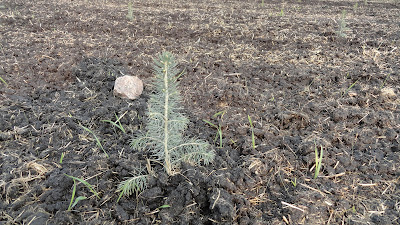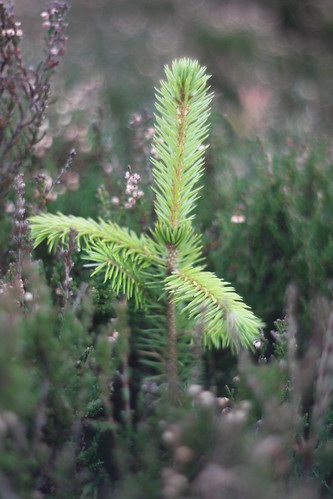Currently, all 250 Colorado Spruce saplings are planted in the ground, or in pots where they can be moved easily. Besides the trees we ordered, I planted 185 other trees, meaning 385 in total. Some of these were larger trees that had to be transplanted to a new location to survive. A large portion were small trees that were in our garden and on our lawn. To avoid the tiller and lawnmower, I moved them to pots were they can safely grow for a few years before being moved to the ground. All of the tree are being watered and weeded regularly.
Reducing My Ecological Footprint
Monday, 8 June 2015
Thursday, 28 May 2015
How we Plant our Trees
As of Friday May 8, we received our order of 250 evergreen saplings. In order to plant such a large quantity, there are several steps required to speed up the process.
First, an ideal location must be found. It must be large enough to give the trees adequate space to grow (at least 5 feet between trees, but varies). It also must be in a location with good soil and water supply.
 Second, you may want to till strips of land to place the trees in. From my experience of planting onions with my mentor (I planted around 1800 personally in a day), I realize how much quicker things go when you don't have to dig a hole in hard ground each time. With nice, soft soil, a small tree requires little effort to plant.
Second, you may want to till strips of land to place the trees in. From my experience of planting onions with my mentor (I planted around 1800 personally in a day), I realize how much quicker things go when you don't have to dig a hole in hard ground each time. With nice, soft soil, a small tree requires little effort to plant.
Third, mark out rows with posts to ensure that there is around seven feet in between each tree. This way, the trees will never have to be moved and will have enough water and nutrients. This also allows you to fit a lawnmower in-between the rows to keep the land looking well maintained.
Then it is most efficient to dig 5-10 holes at a time. For small trees especially, digging a hole takes only around 15 seconds. For our saplings, the holes are about 8 inches deep.
Finally, place a small tree in the hole, surrounding it with soft and moist soil. Make sure all the mud that was taken out of the hole is covering the base of the tree and packed tight. This provides support and holds sufficient water near the roots.
First, an ideal location must be found. It must be large enough to give the trees adequate space to grow (at least 5 feet between trees, but varies). It also must be in a location with good soil and water supply.
 Second, you may want to till strips of land to place the trees in. From my experience of planting onions with my mentor (I planted around 1800 personally in a day), I realize how much quicker things go when you don't have to dig a hole in hard ground each time. With nice, soft soil, a small tree requires little effort to plant.
Second, you may want to till strips of land to place the trees in. From my experience of planting onions with my mentor (I planted around 1800 personally in a day), I realize how much quicker things go when you don't have to dig a hole in hard ground each time. With nice, soft soil, a small tree requires little effort to plant.Third, mark out rows with posts to ensure that there is around seven feet in between each tree. This way, the trees will never have to be moved and will have enough water and nutrients. This also allows you to fit a lawnmower in-between the rows to keep the land looking well maintained.
Then it is most efficient to dig 5-10 holes at a time. For small trees especially, digging a hole takes only around 15 seconds. For our saplings, the holes are about 8 inches deep.
Finally, place a small tree in the hole, surrounding it with soft and moist soil. Make sure all the mud that was taken out of the hole is covering the base of the tree and packed tight. This provides support and holds sufficient water near the roots.
Friday, 22 May 2015
Progress Update
I have started, with the help of my mom, the monstrous task of planting the 250 seedlings on our property. My mom has been an unexpented mentor, providing knowledge and experience as we plant together. Currently 80 are in the ground. It is hard to find time to plant them, because of sports, school and work. Also, the trees can only be planted on certain days, when the ground is not to wet or dry. The 170 remaining seedlings don't have much longer before they have to be planted, which means I will have plenty of late nights ahead of me.
 In total so far, I have (trans)planted 206 trees. If the trees were to remain where they were originally, they wouldn't grow successfully, or be killed by lawnmowers or other causes. The willow cuttings however, didn't survive. My mom says that the bucket in which they were soaking was in a too hot location for the roots to grow. It is a major blow to my project, losing 30-40 trees, but I hope to make up for it with other trees.
In total so far, I have (trans)planted 206 trees. If the trees were to remain where they were originally, they wouldn't grow successfully, or be killed by lawnmowers or other causes. The willow cuttings however, didn't survive. My mom says that the bucket in which they were soaking was in a too hot location for the roots to grow. It is a major blow to my project, losing 30-40 trees, but I hope to make up for it with other trees.
 In total so far, I have (trans)planted 206 trees. If the trees were to remain where they were originally, they wouldn't grow successfully, or be killed by lawnmowers or other causes. The willow cuttings however, didn't survive. My mom says that the bucket in which they were soaking was in a too hot location for the roots to grow. It is a major blow to my project, losing 30-40 trees, but I hope to make up for it with other trees.
In total so far, I have (trans)planted 206 trees. If the trees were to remain where they were originally, they wouldn't grow successfully, or be killed by lawnmowers or other causes. The willow cuttings however, didn't survive. My mom says that the bucket in which they were soaking was in a too hot location for the roots to grow. It is a major blow to my project, losing 30-40 trees, but I hope to make up for it with other trees.Friday, 1 May 2015
Progress update
 |
| Willow cuttings |
This weekend, the first time I won't be busy in a while, I will start to transplant some of our older trees to our other property. They are currently much too close to each other and it is hindering growth. With the spots I free up, I will fill next weekend when our tree order comes in.
The next few weeks will be a lot of hard work, as I get the bulk of my project done.
Friday, 24 April 2015
The Environmentally-Friendly Tesla
One of the most impressive cars on the market today is the Tesla Model S. Despite the fact Tesla didn't release a new car, it was named Consumer Report's Best Car for the second year in a row. Out of all the electric vehicles, Tesla has the most advanced and efficient battery system that allows it to go farther on a single charge, travelling close to 400 km. Having an electric car like this reduces your carbon emissions for most areas of the world. Electric vehicles are more harmful to build, but the negative effects decrease after that. It depends on how the electricity is created, as coal burns dirtier than a gasoline engine. Here in Manitoba, with hydroelectricity, it is definitely a good choice.
Thursday, 16 April 2015
Bikes
Instead of driving a vehicle everyday to and from school, my friend and I have started to bike the 17km trek to school. We do it on days when we don't have sports, and when the weather and our legs cooperate. Not only is it good for the environment, as it produces zero emissions, it is quite healthy as well. It means that I can get 90 minutes of intense physical activity solely in my commute. It is also quicker than taking a school bus. When I arrive at school in the morning, I am alert and awake. If you don't want to pay the ridiculous price of gasoline or a car, simply ride a bike instead.


Friday, 20 March 2015
Slight Change of Plans
Due to a misconception I had about the state of our tree order, my plans had to change. Originally I had hoped to plant 600 one year old evergreens. I was told that my family had ordered the trees, when in reality my parents only had 600 trees in their online cart. When we returned to finalize our order, the trees were sold out. In place of those trees, we purchased two year old trees that were more expensive. It ended up costing around $275 for 250 colorado spruce trees. The website is run by the Manitoba Forestry Association, called ThinkTrees. In addition to providing a cheap source for purchasing young trees, it also offers information and classes to learn about planting trees. It is more most efficient way to plant large amount of trees, as the cheapest tree costs only 50 cents, and can be bought in large quantities.
To make up for the smaller order, I will be taking some willow tree cuttings. In the spring, willow trees have yellow branches that are filled with the young plant cells that allow them to create roots while sitting in water. After leaving the branches in buckets of water for a couple of weeks, I should be able to plant them successfully.
To make up for the smaller order, I will be taking some willow tree cuttings. In the spring, willow trees have yellow branches that are filled with the young plant cells that allow them to create roots while sitting in water. After leaving the branches in buckets of water for a couple of weeks, I should be able to plant them successfully.
Subscribe to:
Posts (Atom)






